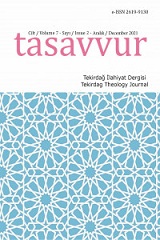Fıkıh Usûlünün Yenilenmesi Tartışmalarında Fikrî ve Felsefî Yaklaşım (Fazlurrahman, Hasan Turabî ve Muhammed Müctehid Şebusterî Örneği)
Intellectual and Philosophical Approach in the Renewal of the Fiqh Method (Example of Fadhlurrahmān, Hasan Turābī and Muhammad Mujtahid Shebustarī)
Author(s): Seracettin EraydinSubject(s): Islam studies, Methodology and research technology, Sharia Law
Published by: Tekirdağ Namık Kemal Üniversitesi İlahiyat Fakültesi
Keywords: Fiqh method; Renewal; Fadhlurrahmān; al-Turābī; Shebustarī;
Summary/Abstract: When we look at the history of Islamic law, it is possible to say that the fiqh method has developed in a process from the beginning. In this process, it can be mentioned that many scholars, especially mujtahids, who we call sect imams, have contributed to the structure of the science of fiqh. For example, Imam Abū Ḥanīfa (d. 150/767) recoursed to istiḥsān, Imām Mālik (d. 179/795), accepted the relegious actions of people in Madinah as ruling and Imam Shāfiʿī (d. 204/820) put forward a method in his work "ar-Risāla", with the formation he obtained by combining the fiqh of both Ahl al-Ra’y and Ahl al-Hadith. These are the prominent contributions that constitute the structure of the science of fiqh. In addition to these contributions, scholars such as Ghazāli (d. 505/1111), Ibn Taymiyya (d. 622/1225), his student Ibn Qayyim (d. 751/1350) and Shātibi (d. 790/1388), especially during and after the institutionalization of sects, put forward some renewal efforts for the mentioned science in order to bring dynamism to the fiqh method. In the modern period, it is seen that the efforts to renew the fiqh method are much clearer and more widespread than in the classical period. In this period, it is possible to evaluate the efforts to renew the fiqh method in two stages. The first of these stages is the stage of calling to renew the fiqh method, and the second is the practical stage of renewing the fiqh method. In the second stage, two basic approaches can be mentioned, namely "fiqh and procedural approach" and "intellectual and philosophical approach", which also contain different theses, depending on the religious, political, social and philosophical tendencies of the scholars. In this study, we will try to present the views of the intellectual and philosophical approach on renewing the fiqh method, which has different tendencies in itself, in the example of Fadhlurrahmān (1919-1988), Hasan al-Turābī (1932-2016) and Muhammad Mujtahid Shebustarī (b. 1936-d…).
Journal: Tasavvur Tekirdağ İlahiyat Dergisi
- Issue Year: 7/2021
- Issue No: 2
- Page Range: 1383-1410
- Page Count: 28
- Language: Turkish

